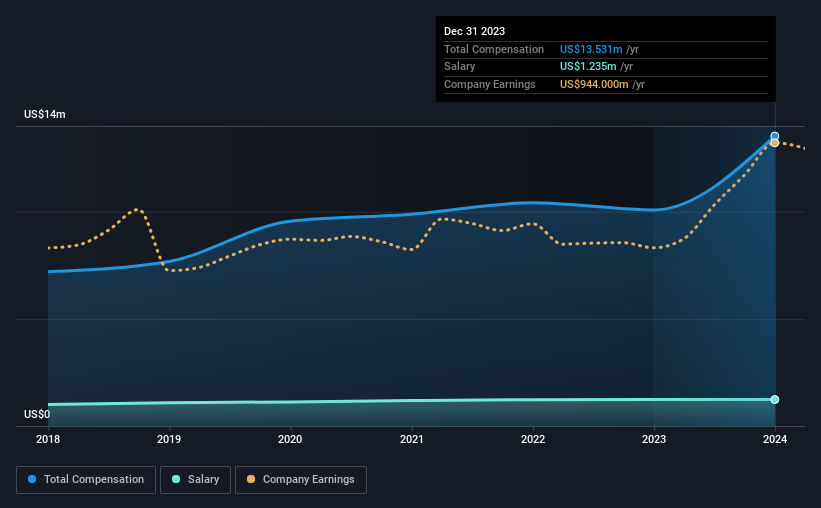Shareholders May Be More Conservative With Vulcan Materials Company's (NYSE:VMC) CEO Compensation For Now
Key Insights
Vulcan Materials' Annual General Meeting to take place on 10th of May
Salary of US$1.24m is part of CEO Tom Hill's total remuneration
Total compensation is 163% above industry average
Vulcan Materials' EPS grew by 10% over the past three years while total shareholder return over the past three years was 41%
CEO Tom Hill has done a decent job of delivering relatively good performance at Vulcan Materials Company (NYSE:VMC) recently. This is something shareholders will keep in mind as they cast their votes on company resolutions such as executive remuneration in the upcoming AGM on 10th of May. However, some shareholders will still be cautious of paying the CEO excessively.
View our latest analysis for Vulcan Materials
Comparing Vulcan Materials Company's CEO Compensation With The Industry
According to our data, Vulcan Materials Company has a market capitalization of US$35b, and paid its CEO total annual compensation worth US$14m over the year to December 2023. That's a notable increase of 34% on last year. We think total compensation is more important but our data shows that the CEO salary is lower, at US$1.2m.
On comparing similar companies in the American Basic Materials industry with market capitalizations above US$8.0b, we found that the median total CEO compensation was US$5.1m. This suggests that Tom Hill is paid more than the median for the industry. What's more, Tom Hill holds US$26m worth of shares in the company in their own name, indicating that they have a lot of skin in the game.
Component | 2023 | 2022 | Proportion (2023) |
Salary | US$1.2m | US$1.2m | 9% |
Other | US$12m | US$8.8m | 91% |
Total Compensation | US$14m | US$10m | 100% |
On an industry level, around 13% of total compensation represents salary and 87% is other remuneration. In Vulcan Materials' case, non-salary compensation represents a greater slice of total remuneration, in comparison to the broader industry. If non-salary compensation dominates total pay, it's an indicator that the executive's salary is tied to company performance.
Vulcan Materials Company's Growth
Vulcan Materials Company's earnings per share (EPS) grew 10% per year over the last three years. Its revenue is up 3.4% over the last year.
This demonstrates that the company has been improving recently and is good news for the shareholders. It's good to see a bit of revenue growth, as this suggests the business is able to grow sustainably. Historical performance can sometimes be a good indicator on what's coming up next but if you want to peer into the company's future you might be interested in this free visualization of analyst forecasts.
Has Vulcan Materials Company Been A Good Investment?
Most shareholders would probably be pleased with Vulcan Materials Company for providing a total return of 41% over three years. This strong performance might mean some shareholders don't mind if the CEO were to be paid more than is normal for a company of its size.
In Summary...
Given that the company's overall performance has been reasonable, the CEO remuneration policy might not be shareholders' central point of focus in the upcoming AGM. Still, not all shareholders might be in favor of a pay raise to the CEO, seeing that they are already being paid higher than the industry.
CEO compensation is a crucial aspect to keep your eyes on but investors also need to keep their eyes open for other issues related to business performance. We've identified 2 warning signs for Vulcan Materials that investors should be aware of in a dynamic business environment.
Of course, you might find a fantastic investment by looking at a different set of stocks. So take a peek at this free list of interesting companies.
Have feedback on this article? Concerned about the content? Get in touch with us directly. Alternatively, email editorial-team (at) simplywallst.com.
This article by Simply Wall St is general in nature. We provide commentary based on historical data and analyst forecasts only using an unbiased methodology and our articles are not intended to be financial advice. It does not constitute a recommendation to buy or sell any stock, and does not take account of your objectives, or your financial situation. We aim to bring you long-term focused analysis driven by fundamental data. Note that our analysis may not factor in the latest price-sensitive company announcements or qualitative material. Simply Wall St has no position in any stocks mentioned.

